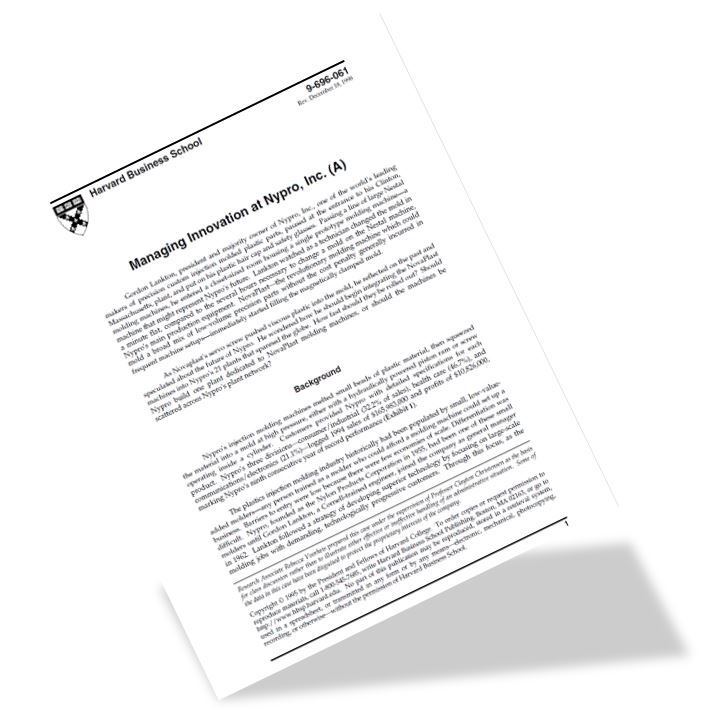How to read and prepare an HBS-style MBA Case
/HBS is among the most prolific producers of Business School case studies
MBA classrooms all over the world use cases to teach. Each case tells the story of a business problem from the point-of-view of a “case protagonist.” Cases ground a future conversation about what the protagonist should do, and the goal of that conversation is to arrive at some insight that students can use when facing similar business challenges in the future.
While many business schools write cases for use in their classrooms as well as others, all cases generally follow the same format: a page setting up the situation, followed by some pages of background historical information, a longer narrative of the problem, the decision to be made, and concluding with numerous pages of data and exhibits. The cases are short, but are meant to be comprehensive for the following case conversation. This makes the case conversation more realistic as business leaders often have to lead their firms through uncertainty and with limited information.
Sounds simple, right?
In fact, it’s deceptively simple. Cases end up being remarkably dense, making them much harder and slower to read than a Wall Street Journal article. Their stories open up a million doors, making it difficult to tell where the case conversation might actually go. Their data can be analyzed in a million different ways, each taking up valuable time that could be spent preparing for other classes or recruiting interviews. So how can you work smarter and prepare the case properly?
1. Know where the case fits into the curriculum
The first case in a class is a special introductory case meant to include and highlight all of the topics you’ll cover over the course. The last case is a capstone summarizing all of the concepts previously covered. Usually one or both of the two were previously used as the basis for a final exam. All the other cases in the sequence (except those meant to accommodate the personal schedules of visiting case protagonists) are meant to illustrate an incremental concept within a module. Look at the syllabus for clues as to what those concepts might be so that you can run the analysis before class. Examples might include calculating the appropriate WACC in finance or analyzing the 4 P’s in marketing.
2. Before you start reading, set a timer
Parkinson's Law states that work will expand to consume all the resources available to it. The same goes for cases. There is always another analysis to run; always more investopedia articles to read. Rather than allow the case to eat up your schedule, set a timer and “time box” your analysis. When the timer goes off, stop working on that case and move onto the next one.
Shoot to get your reading and analysis down to an hour or less per case by the end of first year. At the start, you’ll probably need to give yourself something closer to 90-120 minutes.
3. Get your bearings
Before you read the case cover to cover, skim it to get your bearings. First, read the entire first page, then the first line of each paragraph, and then all of the exhibits to orient yourself. Understand that cases are each meant to stand alone as a document, and so they include a lot of extra detail that anyone with Google can just look up for themselves. By skimming you can avoid the red herrings and focus on the details that matter. Ask: what is the decision that has to be made? What are the immediate causes of the central problem? And who are the stakeholders?
4. Skip historical background section
This is usually on pages 2-4. You can read it if you're personally interested, but it is almost never relevant.
After extensive testing, these Pilot Dr. Grip 4+1 pens are way better than the traditional Bic 4-Color pens
5. Develop a note taking system.
I’m a fan of 4-color pens. Here is my system: black is for all primary notes; blue is for organizing primary notes, taking secondary notes, and making revisions; red is for all names and contact information; green is for all to-dos and follow-ups.
As I read a case, I box all stakeholders and circle all numbers in red. I take notes to answer discussion questions in black. I note all questions I want to look-up or ask my discussion group in green. I save blue to write a summary of the case discussion and the major takeaways at the top of the first page of the case when there is only 5-10 min left in class.
6. Apply any frameworks you have been given
Frameworks that get introduced in one class tend to make repeat appearances in the following classes. Most first-year classes spend the first half of each session drawing out these frameworks on the blackboard and then filling them in, fact by fact. If you’re just looking to make a quick "chip shot" comment in class, offering a piece of analysis to fill these frameworks can be a great way to do that. To calm your nerves and give yourself a lifeline in case of a cold call, fill in the full framework in advance so you won’t be caught off guard in the moment. If you’re gunning for a good grade and a next-level comment, don’t use the frameworks to answer "case fact questions" – instead use them to see further faster. Use them to see what the analytical conclusion will be and then be ready to make sense of it once it is revealed.
For example, in marketing class I just took the summary slides that the professor showed us with the frameworks on them, deleted the text, printed them out, and took notes on that sheet. Because I did that, I would often understand earlier than my peers which channels were most profitable for a company to use, which price points to target, or which product lines to discontinue.
7. Only conduct hypothesis-based analysis
Even a short case has too much data to run all the numbers. Plus “boiling the ocean” is not how business leaders make decisions anyway. Instead develop 1-2 theories as to why the the business is facing the problem that it is and then run the numbers to see if you’re right. Or, if you think you know what the key takeaway from the case will be -- such as calculating beta for comparable financial analysis (see #1 in this list) -- run just that analysis.
8. Ask if you have any relevant experience worth sharing
Those comments tend to be memorable, bring the section closer together, and yield better grades.
9. Limit your notes to 1-2 pages, print single sided
They’ll need to be short enough to reference in the heat of the moment. You won’t want to be flipping pages back and forth either.
10. Remember that preparation does not end when class starts
Keep taking notes as the class goes on, either in a notebook or in the case. I print out my case notes in black and take notes by hand in blue. By taking notes, I can often anticipate where the class is going to go and cut it off at the pass with a great comment.
11. When there are 5 minutes left, begin taking summary notes
In blue, if you're using my method. See #5 in this list. That way you won't forget the lesson, either for the final exam or for use beyond.
12. Evaluate yourself
Ask how well you did at (1) finding the “big question” of the case, (2) identifying the key data, (3) analyzing that data correctly, (4) using that data to arrive at the right decision, and (5) communicating that decision logically and persuasively in class.




















